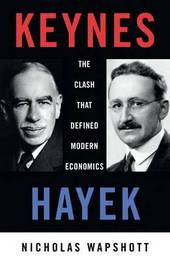
|
Keynes Hayek: The Clash that Defined Modern Economics
Paperback / softback
Main Details
| Title |
Keynes Hayek: The Clash that Defined Modern Economics
|
| Authors and Contributors |
By (author) Nicholas Wapshott
|
| Physical Properties |
| Format:Paperback / softback | | Pages:382 | | Dimensions(mm): Height 236,Width 150 |
|
| Category/Genre | Economics
Economic theory and philosophy
Political economy |
|---|
| ISBN/Barcode |
9781921844362
|
| Classifications | Dewey:330.00 |
|---|
| Audience | | General | | Tertiary Education (US: College) | |
|---|
|
Publishing Details |
| Publisher |
Scribe Publications
|
| Imprint |
Scribe Publications
|
| Publication Date |
31 October 2011 |
| Publication Country |
Australia
|
Description
As the stock-market crash of 1929 plunged the world into turmoil, two men emerged with competing claims about how to restore balance to economies gone awry. John Maynard Keynes, the mercurial Cambridge economist, believed that government had a duty to spend when others would not. He met his opposite in a little-known Austrian economics professor, Freidrich Hayek, who considered attempts to intervene both pointless and potentially dangerous. The battle lines thus drawn, Keynesian economics would dominate for decades and coincide with an era of unprecedented prosperity, but conservative economists and political leaders would eventually embrace and execute Hayek's contrary vision. From their first face-to-face encounter to the heated arguments between their ardent disciples, Nicholas Wapshott here unearths the contemporary relevance of Keynes and Hayek, as arguments over the virtues of the free market and government intervention rage with the same ferocity as they did in the 1930s. This is no mere academic debate - with the world economy teetering, the stakes are very high for all of us.
Author Biography
Nicholas Wapshott has written a number of biographies, including those of Margaret Thatcher and Carol Reed.
ReviewsIn the fluency of his writing and his ability to make complex financial questions easily comprehensible, Nicholas Wapshott has done economics itself a great service, by opening the subject up to the general reader, as seen through the prism of one of the most important intellectual gladiatorial contests of modern times. --Andrew Roberts, The Storm of War: A New History of the Second World War"
|